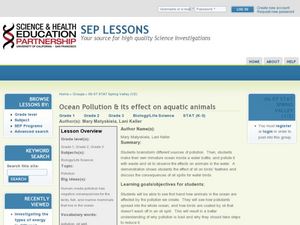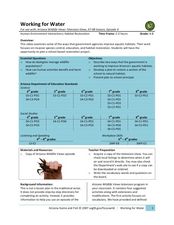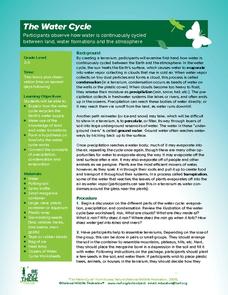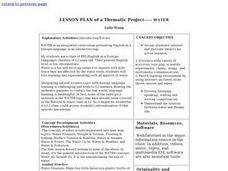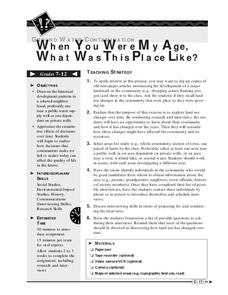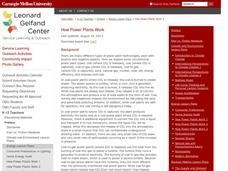Curated OER
Who Dirtied The Water/Clean Water: Is It Drinkable?
Students enter the room, receive a film canister that contains materials that be added to the dirty water bell jar. They record on their data table who or what is doing the adding and the actual substance that has been added to the bell...
Curated OER
Clean Water vs. Dirty Water
Students study the importance of clean water to the survival of organisms and what activiities and material pollute water. They measure the temperature of water samples and create a class graph.
Curated OER
Let us Help
Students explore water conservation. In this ecology and civic responsibility lesson, students identify agencies that monitor and help improve water quality and describe what they do. Students research these organizations and work in...
Curated OER
Seepy Sandwich
Students study how water infiltration can carry pollution underground. In this water infiltration lesson, students conduct an experiment on water infiltration and underground pollution.
Curated OER
Ocean Pollution & its Effect on Aquatic Animals
Students consider the concept of ocean pollution. In this ocean instructional activity, students participate in a hands-on demonstration in order to replicate an oil spill and its effects on marine life.
Curated OER
Crossing Polluted Waters
Pupils investigate the different concepts involved in crossing a body of water that is polluted through a simulation that is supposed to be done without a boat. The goal of the lesson plan is for groups to role play after creating a plan...
Curated OER
Air Pollution: Visible and Invisible
Fourth graders work together to complete an experiment on air pollution. They identify visible and invisible forms of pollution. They gather their data in notebooks and analyze their results to end the lesson.
Curated OER
The Water Cycle - Family Page
Learners discuss the steps of the water cycle. They create their own model of the water cycle. They complete the Family Page at the end of the lesson.
Curated OER
Working for Water
Students examine the ways that government works to help improve aquatic habitats. In this water habitats lesson students view a video and plan a school restoration project.
Curated OER
The Water Cycle
Learners are introduced to the components and importance of the water cycle. They are shown how groundwater moves using a model. Students list 9 places on earth where water is found. They define the terms cycle and water cycle.
Curated OER
Lesson Plan of a Thematic Project - Water
Sixth graders investigate the properties of water. In this life science instructional activity, 6th graders create a concept map of water. They share their work with the class.
Curated OER
When You Were My Age, What Was This Place Like?
Students discover how land use in their community has changed. In this community and ecology lesson, students scan old newspapers to find articles about the development of community land. Students discuss and predict how land use has...
Curated OER
Leach Out and Touch Someone
Students discuss how groundwater becomes polluted. In groups, they design and create models of groundwater pollution sources. They demonstrate to the class how the water may become contaminated from local and nonlocal pollution sources.
Curated OER
Easy Street
Young scholars work together to complete a simulation on drought days. As a class, they discuss their results and compare water usage of the past to current numbers. After reading short excerpts, they answer discussion questions and...
Curated OER
Acid (and Base) Rainbows
Learners are introduced to the differences between acids and bases and how to use indicators, such as pH paper and red cabbage juice, to distinguish between them. They make predictions that can be answered through scientific...
Curated OER
Turning the Tide on Trash: Marine Debris Curriculum
Seven pages of fascinating reading on marine debris preface the activities in this lesson plan. Four different activities are employed to simulate how the debris is distributed in the ocean and along beaches. Early ecology learners...
WE Charity
High School–Module 2: Circular Economy and Nature
Everyone's heard the popular slogan reduce, reuse, recycle, but there may be a better way to talk about sustainability. Using the second lesson from the five-part WE Are Innovators—High School Modules series, learners explore issues...
Curated OER
Are You Thirsty: The Effects of Pollution on Drinking Water
Middle schoolers discuss the different causes of water pollution. In this ecology lesson, students brainstorm ways to purify polluted water. They formulate their conclusion based on the results of the experiments.
Curated OER
Arsenic Contamination: Water Filtration
Students work in groups to design a filtration process that will separate clean water from polluted water. They organize data in tables or graphs and present their findings to the class. Students identify further safety protocols that...
Curated OER
Human Impact on Water Quality
Students identify at least three common repercussions of developing water front property on water quality. They describe three sources of water pollution. They research the organism striped bass and observe it if striped bass is available.
Carnegie Mellon University
How Power Plants Work 2
For this second of three lessons on power plants, future engineers find out how we generate electricity and how coal-powered plants operate. They work in small groups to make electromagnet generators to light LED bulbs. A set of...
Carnegie Mellon University
How Power Plants Work 3
Double, double toil and trouble, fire burn and cauldron bubble! Find out what drives a turbine to generate electricity and whether or not it has an impact on the environment. A discussion and lecture is divided by a hands-on activity in...
Polar Trec
Why Can’t I Eat This Fish?
Can turning on the television lead to toxins in the food supply? The instructional activity offers an opportunity for young scientists to complete guided research. A worksheet lists each question as well as the web page necessary to...
Teach Engineering
Introduction to Environmental Engineering
A series on environmental engineering introduces the class to issues that environmental engineers work to solve. This first instructional activity focuses on air and land issues, and looks at ways to reduce pollution.






